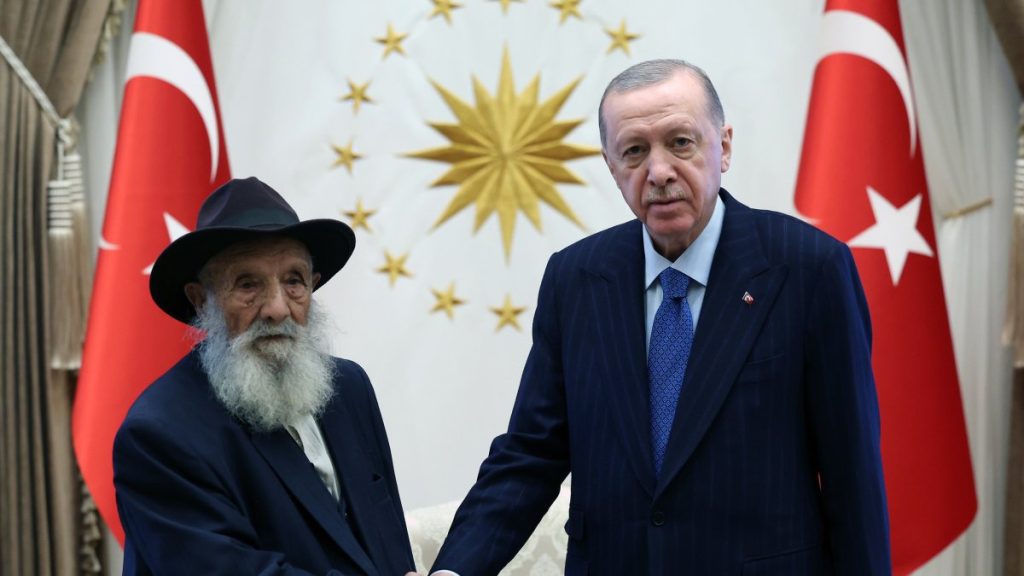President Recep Tayyip Erdoğan had a surprise guest earlier this week. Ahmet Uğurlu, an elderly Alevi dede (a socio-religious leader for the community) met Erdoğan at the Presidential Complex.
Media reports say Uğurlu conveyed the Alevi community’s requests to the president, whose tenure has been marked by a new outreach to the community.
According to a report by the Sabah newspaper, among these requests are the establishment of schools to train dedes, similar to imam-hatip schools that provide a curriculum with extra theology lessons to train imams, and state funds to pay wages for staff at cemevis, the community’s self-styled place of worship.
Uğurlu also thanked Erdoğan for steps taken to preserve the Alevi heritage of the country, while Erdoğan instructed bureaucrats to handle the requests by Uğurlu.
Uğurlu is known as an influential figure among the Alevi community in the eastern province of Erzincan and won hearts when he organized a massive rally in support of Palestinians under Israeli oppression on Jan. 1 in Erzincan.
Erdoğan was instrumental in the foundation of the Alevi-Bektashi Culture and Cemevi Presidency in 2022 to reach out to the long-neglected community. Since its foundation, the presidency, operating under the Culture and Tourism Ministry, endorsed dozens of civic society organizations linked to the community and responded to several requests. The presidency mainly helps cemevis to cover maintenance and repair fees, as well as utility use fees, such as water and electricity.
The Alevi faith is defined as a combination of Shiite Islam, the Bektashi Sufi order and Anatolian folk culture rather than as a separate religion. In Türkiye, Alevis make up a large community with approximately 20 million followers, though official figures are unavailable.
The community has a list of concerns about various issues, including the public recognition of their identity, the legal status of cemevis and funding, as well as the prerogative for Alevi students to be excluded from compulsory religion classes in elementary and high schools. The cemevis are currently regarded as foundations under the Interior and Culture and Tourism Ministries rather than recognized as houses of worship, which would legally entitle them to receive state funding like mosques, churches and synagogues of recognized religious minorities in the country. Some 80% to 90% of all cemevis in the country were built during the successive ruling Justice and Development Party (AK Party) governments since 2002. The 2022 move to establish the Cemevi Presidency was a landmark decision for Türkiye as it was enshrined in legislation by Parliament to officially address the needs of the Alevi community for the first time in the republic’s history. The law also granted cemevis the right to receive discounted or free water access provided by municipalities and their subsidiaries.
There had been previous attempts at improvement of the state of the community. In 2009, the first “Alevi initiative” was launched during the term of then-Prime Minister Recep Tayyip Erdoğan. Alevi leaders and representatives attended several workshops with the government over a six-month period. Later, in 2011, Erdoğan issued an unprecedented apology on behalf of the Turkish state for the Dersim Massacre. The tragedy took place in 1937 when 13,806 people were killed following a military campaign after the predominantly Alevi Zaza Kurdish tribes who opposed the 1934 Resettlement Law passed by the single-party regime of the time. Another “Alevi opening” initiative was launched in 2014, and a council was formed to discuss issues in 2016. But no concrete developments followed until 2021, when Erdoğan’s government began conducting visits to some 1,585 cemevis across the country for an extensive report, and the “research of Alevi-Bektashi culture and conducting business and operations related to cemevis” has added to the duties and authorities of the Culture and Tourism Ministry.


